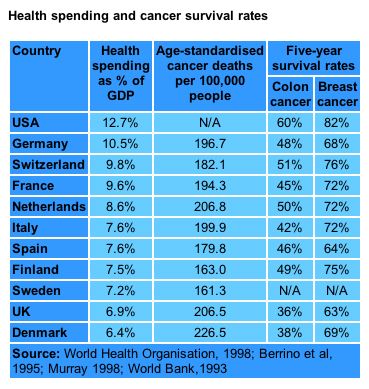Follow-up on Health Care
As a follow-up to this post, I wanted to take on the argument that people use against the US's health care system, arguing that it must be worse than other countries socialized approach because it costs so much more. Well, I am the first to agree that reduced regulation and a better matching of who is paying the cash to who is receiving the services would result in huge cost savings. However, it may also be true that you get what you pay for, as discussed in Cafe Hayek. The key chart is shown below:
One thing I forgot to mention in the previous post was a bit of background of exactly why we have a model where health care is payed for by the employer. This structure of company-paid health care was not a natural market evolution, but was in fact a direct result of several very distorting government regulations.
Company funded health care plans began in the 1930's and 1940's as a way for companies to try to get around government controls and freezes on wage rates, first instituted with the NRA and later during WWII. In particular, during the incredibly tight domestic labor markets in WWII, employers struggled with government-mandated wage controls, and used the promise of employer-paid health care as a way to provide higher effective compensation to attract employees, since these non-cash benefits were not counted in the wage freeze calculation. After the war, the government locked in this practice when the IRS and Congress agreed that company-paid health care was not taxable as regular income, meaning that such health plans were given a strong tax-preference over cash wages.
Finally, if you are not familiar with the appalling experiment in fascism that was the NRA, I wrote about it here.

"As a follow-up to this post, I wanted to take on the argument that people use against the US's health care system, arguing that it must be worse than other countries socialized approach because it costs so much more."
No, that's only half the argument. There is no doubt that the United States is in the forefront of developing new medicines and technology, and American trauma centers are second to none.
And yet, if you look at this chart of overall life expectancy
http://www.nationmaster.com/graph-B/hea_lif_exp_at_bir_tot_pop&int=-1
The United States places 47th (224-177), behind such countries as Jordan and Israel, which are arguably warzones.
Might I suggest a broader view, that our improved health today is largely due to improved hygiene, antibiotics and reasonably healthy lifestyles, and that all the money Americans spend perhaps adds only an aggregate of five years to life expectancy in America, and that these gains are easily canceled out by lifestyle choices of Americans, which is why we're 47th?
Our immigrant population may also have something to do with those life-expectancy figures. How many of them never saw a doctor before they came here?
One thing with focusing on cancer is that, other things being equal, I'd expect the country with the lowest life expectancy overall to have the best cancer statistics - cancer is something to worry about only after you've beaten all the other diseases that might kill you first.
I doubt immigration has a lot to do with it. Canada has more immigrants per capita than the US but is much higher in life expectancy ranking than the US.
Overall life expectancy isn't necessarily a good metric. For some reason, America has a higher infant mortality rate than some other developed countries. How does life expectancy at age 18 stand up against other nations?
Obviously a small increase in infant mortality will have a big effect on overall average life expectancy. And you could make the argument that infant mortality is partly due to improper prenatal care for women in this country. But quoting overall average life expectancy without that caveat may not give a fully accurate picture.
That's a good point. There is a correlation of the high rate of caesarians and drugs, the low rate of use of midwives (this connects to your point about pre-natal care), and the high rate of use of obstetricians in the US, to the high infant mortality rate. So in this case, all that money and technology is probably hurting us.
I've also heard that Americans tend to work more hours than most other industrialized nations, leading to higher overall stress levels. That, coupled with the fact that Americans eat far more than we really should, and have obscene obesity rates, and all this stuff contributes.
Now, working too hard is part of what makes this the largest economy in the world, and the very ability to eat too much is a sign of our nation's abundance of food and high standard of living. But it kills us quicker.